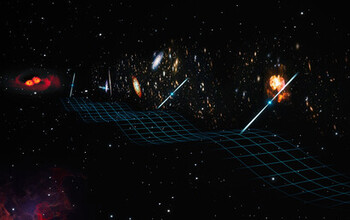Gravitational waves from colossal black holes found using 'cosmic clocks'

An artist's rendering of gravitational waves emitted from a pair of ultra-massive black holes.
June 29, 2023
Radio telescope observations of Milky Way pulsars reveal spacetime distortions likely caused by enormous gravitational waves rolling through everything in existence.
You can't see or feel it, but everything around you — including your own body — is slowly shrinking and expanding. It's the weird, spacetime-warping effect of gravitational waves passing through our galaxy, according to a new study by a team of researchers with the U.S. National Science Foundation's NANOGrav Physics Frontiers Center.
The findings published today in The Astrophysical Journal Letters are from the North American Nanohertz Observatory for Gravitational Waves (NANOGrav), a collaborative team of researchers from more than 50 institutions in the U.S. and abroad. The team conducted an analysis of burned-out stars known as millisecond pulsars, which rotate hundreds of times per second and emit radio pulses like ticks from highly accurate cosmic clocks. The team discovered what appeared to be variations in the "ticking rate" of such pulsars by comparing observations of more than 60 pulsars within radio telescope data spanning 15 years. Their analysis provides evidence that the variations are caused by low-frequency gravitational waves which are distorting the fabric of physical reality known as spacetime.
The U.S. National Science Foundation propels the nation forward by advancing fundamental research in all fields of science and engineering. NSF supports research and people by providing facilities, instruments and funding to support their ingenuity and sustain the U.S. as a global leader in research and innovation. With a fiscal year 2023 budget of $9.5 billion, NSF funds reach all 50 states through grants to nearly 2,000 colleges, universities and institutions. Each year, NSF receives more than 40,000 competitive proposals and makes about 11,000 new awards. Those awards include support for cooperative research with industry, Arctic and Antarctic research and operations, and U.S. participation in international scientific efforts.
Connect with us online
NSF website: nsf.gov
NSF News: nsf.gov/news
For News Media: nsf.gov/news/newsroom
Statistics: nsf.gov/statistics/
Awards database: nsf.gov/awardsearch/
Follow us on social
Twitter: twitter.com/NSF
Facebook: facebook.com/US.NSF
Instagram: instagram.com/nsfgov
